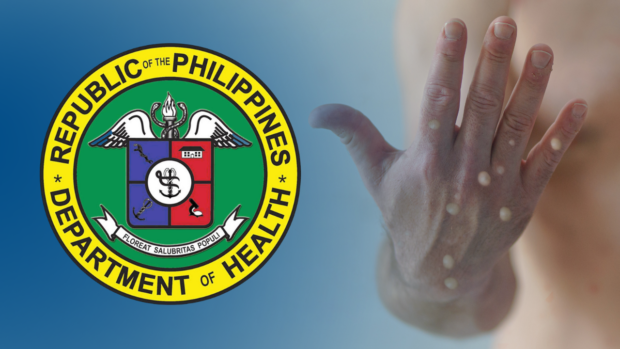MANILA, Philippines — The Department of Health (DOH) maintained that the Philippines remained monkeypox-free even as the World Health Organization (WHO) on Saturday declared the disease a global health emergency — the highest alarm it can sound.
“Up to now, there has been no finding in the Philippines that fits the definition of a suspect monkeypox case,” Health Undersecretary and officer in charge Maria Rosario Vergeire said on Sunday.
“The clinical presentation is often explained by other diseases that look like smallpox but it is not the same,” she added.
The DOH said the country has been preparing for the monkeypox virus ever since an uptick in cases was reported in other countries last May.
On May 24, the DOH issued interim technical guidelines on monkeypox surveillance, screening, management, and infection control.
The health department also activated the Philippine interagency committee on zoonosis last May 27. The committee consists of the DOH, the departments of agriculture and of environment and natural resources and their attached agencies. Zoonosis refers to an infectious disease that is transmitted between species—from animals to humans or from humans to animals.
In line with the WHO’s “temporary” recommendations for countries such as the Philippines that have no history of monkeypox in humans, the DOH said it has activated multisectoral coordination mechanisms to stop transmission, intensify detection capacity and raise awareness about prevention and protective measures.
The DOH said it was working with civil society organizations, community-based groups, social hygiene clinics, and advocates to “properly communicate the risk of monkeypox transmission without stigma.”
“This is consistent with the evidence that anyone can get monkeypox and we must all work together to prevent not just the disease but also the stigma that [it] may cause [with] undetected transmission,” it stressed.
Symptoms
A viral infection resembling smallpox and first detected in humans in 1970, monkeypox is less dangerous and contagious than smallpox, which was eradicated in 1980.
The first symptoms of monkeypox are fever, headaches, muscle pain and back pain during the course of five days.
Rashes subsequently appear on the face, palms of hands and soles of the feet, followed by lesions, spots and finally scabs.
The illness usually lasts two to four weeks.
The virus can spread through direct contact with the infectious rash, scabs or body fluids; respiratory secretions during prolonged, face-to-face contact, or during intimate physical contact, or touching items such as clothing or linen that previously touched the infectious rash or body fluids.
The WHO declared the monkeypox outbreak to be a “public health emergency of international concern” as it has affected nearly 17,000 people in 74 countries.
“I have decided that the global monkeypox outbreak represents a public health emergency of international concern,” WHO chief Tedros Adhanom Ghebreyesus said at a press conference in Geneva.
He said a committee of experts who met on Thursday was unable to reach a consensus, so it fell on him to decide whether to trigger the highest alert possible.
“WHO’s assessment is that the risk of monkeypox is moderate globally and in all regions, except in the European region where we assess the risk as high,” he added.
Call to action
Monkeypox has affected more than 16,800 people in 74 countries, according to a tally by the US Centers for Disease Control and Prevention (CDC) published on July 22.
Washington welcomed the WHO’s declaration as “a call to action for the world community to stop the spread of this virus.”
“A coordinated, international response is essential to stop the spread of monkeypox, protect communities at greatest risk of contracting the disease, and combat the current outbreak,” said Raj Panjabi, senior director for the White House’s global health security and biodefense division.
A surge in monkeypox infections has been reported since early May outside the West and Central African countries where the disease has long been endemic.
Overall, 98 percent of infected people were gay or bisexual men, and around a third were known to have visited sex-on-site venues such as sex parties or saunas within the previous month.
Potential vaccine
Tedros has previously expressed concern that stigma and scapegoating could make the outbreak harder to track.
On June 23, the WHO convened an emergency committee of experts to decide if monkeypox constitutes a so-called Public Health Emergency of International Concern—the UN health agency’s highest alert level.
But a majority advised Tedros that the situation, at that point, had not met the threshold.
The second meeting was called on Thursday with case numbers rising further, where Tedros said he was worried.
Ninety-five percent of cases have been transmitted through sexual activity, according to a study of 528 people in 16 countries published in the New England Journal of Medicine, the largest research to date.
The European Union’s drug watchdog on Friday recommended for approval the use of Imvanex, a smallpox vaccine, to treat monkeypox.
Imvanex, developed by Danish drugmaker Bavarian Nordic, has been approved in the EU since 2013 for the prevention of smallpox.
It was also considered a potential vaccine for monkeypox because of the similarity between the monkeypox virus and the smallpox virus.
—WITH A REPORT FROM AGENCE FRANCE-PRESSE
RELATED STORIES
Monkeypox outbreak constitutes global health emergency – WHO
Gov’t is prepared for monkeypox outbreak – DOH
